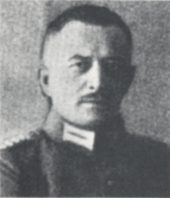Walter Nicolai

Walter Nicolai (August 1, 1873 - May 4, 1947) was the first senior IC (Intelligence) Officer in the Imperial German Army. He came to run the military secret service, Abteilung IIIb, and to be important in the pro-war faction of German leaders during World War I.[1] According to Höhne and Zolling, he was supportive in the foundation of the Fatherland Party.[2]
Life
Walter Nicolai was the son of a Prussian Army Captain and a farmer's daughter in Brunswick. In 1893, he selected a military career. He studied from 1901 to 1904 at the War Academy in Berlin. Trips are known to have taken him shortly before his appointment as Chief of the Intelligence Service of the German High Command to Russia. He spoke fluent Russian. Nicolai was considered ultra-conservative, monarchist, and non-political.[3]
In 1906, Nicolai began his career in Abteilung IIIb, when he took over the news station in Königsburg.[4] He built up the news station in Konigsberg to a major center for espionage against the Russian Empire. After two years of service in early 1913, he was named the head of Abteilung IIIb, which helped to inform others of the Austrian espionage case against Captain Alfred Redl. Nicolai led the German secret service between 1913 and 1919. He directed Abteilung IIIb intensively during the First World War. Nicolai wrote: "Before each new acquisition, delivery pp. to ask the I.O., what benefits it brings for the war. "[5]
When Erich Ludendorff was quartermaster general, there was an expansion of military intelligence for the secret police. Nicolai saw himself as a relentless will to win a military educator, a supervisor and an initiator of patriotic self-discipline. His officers took part in the promotional work for war bonds. Nicolai was behind the founding of the ultra-nationalist Fatherland Party.
After the end of World War I, Nicolai retired as a colonel. His deputy and later successor in 1920 was Major Friedrich Gempp. In his postwar years, Nicolai published two books about his activities.
Under Nazi German, he belonged to the expert advisory board of the Imperial Institute for the History of the New Germany.[6]
After the Second World War, Nicolai was arrested by the Soviet NKVD, deported from Germany, and interrogated in Moscow. He died while in custody on 4 May 1947 at the Hospital of Moscow's Butyrka Prison. His body was cremated and buried at the necropolis of the Donskoy Monastery in a mass grave. It was only in 1999 that Russian military prosecutors formally exhonerated Walter Nicolai of all charges.[7]
Notes
- ↑ see Höhne and Zolling, p 286 onwards.
- ↑ Höhne and Zolling, p. 290
- ↑ Heinz Höhne: Canaris – Patriot im Zwielicht. S. 149.
- ↑ Heinz Höhne: Canaris – Patriot im Zwielicht. S. 150f.
- ↑ Heinz Höhne: Canaris – Patriot im Zwielicht. S. 150.
- ↑ Ernst Klee: Das Kulturlexikon zum Dritten Reich. Wer war was vor und nach 1945. Fischer, Frankfurt am Main 2007, S. 433.
- ↑ Jürgen Schmidt: Spionage: Mata Haris erfolgloser Chef, Tagesspiegel, 7. Oktober 2001
References
- Höhne, Heinz, and Zolling, Hermann (1972). The General Was a Spy. Coward, McCann & Geoghegan, Inc, New York. (Published in Germany as Pullach Intern, 1971, Hoffman and Campe Verlag, Hamburg)